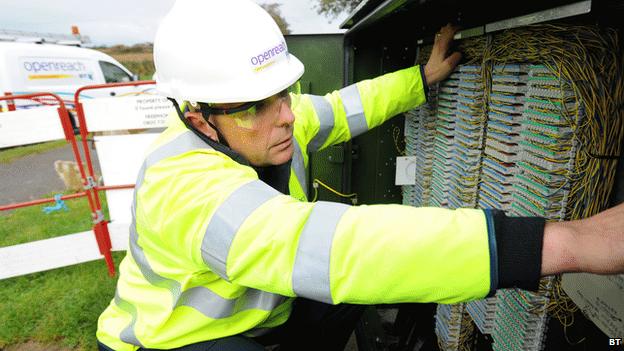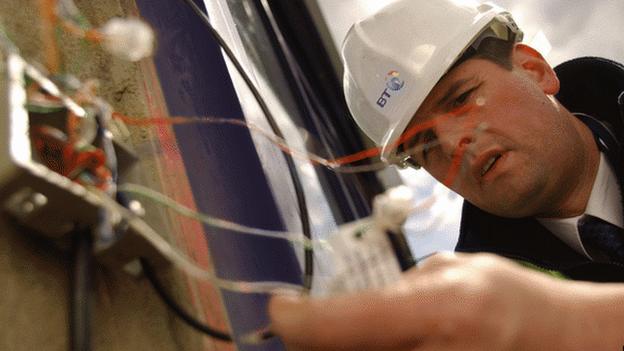UK broadband not fit for purpose, says business group
- Published

Small businesses are frustrated by lack of good broadband
UK broadband is not fit for purpose and a major government rethink is needed, according to a business lobby group.
The Federation of Small Businesses (FSB) says that the UK's broadband target is simply not ambitious enough when compared to other nations.
It is calling on the government to commit to delivering a minimum of 10Mbps (megabits per second) for all homes and businesses by 2018/19.
It would like to see this rise to 100Mbps by 2030.
"If small businesses are to thrive and prosper and contribute to a growing economy, they need universal access to what is now considered the fourth utility," concludes an FSB report on the current state of broadband.
However, the government and BT have said that the FSB's findings do not match reality.
Slow speeds
The report indicated that:
•94% of small business owners consider a reliable internet connection to be critical to the success of their business
•45,000 UK small businesses are still on dial-up speeds
•Only 15% of firms say they are very satisfied with their broadband provision.
Other recommendations include:
prioritising the delivery of fibre-optic broadband to new and existing business parks
a new ambitious national broadband strategy
reform of the broadband market
"The fact that we have around 45,000 businesses still on dial-up is unacceptable and many more throughout the country, even in London, are receiving poor service," said John Allan, chairman of the FSB.
"Evidence from our members shows this clearly is a problem affecting all corners of the UK, rural areas and cities alike. While progress has been made with the residential market, businesses have not enjoyed the same benefits, which is holding back their growth."
But BT suggested the picture was not as bad as the FSB had suggested.
"73% of UK premises can access fibre - including some businesses who say they can't in this report - and that should rise to 90% in under two years," said a spokeswoman.
"Having said that, we know that many businesses are waiting for fibre and it may be they're prominent among the 4% of FSB members that replied to this survey.
"The good news is that fibre should reach the vast majority of that 4% in the coming months or next couple of years under existing plans."
The Department for Culture, Media and Sport added that the report "doesn't reflect the real picture, but rightly highlights the growing importance of broadband to businesses in the digital age".
"In rural areas, more than 600,000 businesses and homes across the nation are already reaping the benefits of superfast access, and we're reaching 30,000 more every single week.
"In our cities, more than 1,000 SME's (small and medium-sized businesses) have already made use of our vouchers to boost their connectivity and free public wi-fi is being rolled out in city centres and on public transport across the UK."
It said that the government would publish a digital communications infrastructure strategy by the end of 2014. to consider broadband infrastructure plans over the next 10-15 years."
Harsh criticism
Finland plans to have a baseline speed of 100Mbps by 2015 while South Korea wants to see citizens equipped with 1Gbps connections by 2017.
By contrast the UK government's ambition is to provide 95% of the UK with speeds of 24Mbps or higher by 2017, with the rest having a minimum speed of 2Mbps.
"This is not sufficiently ambitious," says the report.
It also questions the way broadband has been rolled out in the UK.
BDUK, the group set up to spend £530m of government money allocated for rural broadband, has come in for criticism for delays in distributing funds to councils and for awarding every contract to former monopoly BT.
The harshest criticism was delivered by a Commons Public Accounts Committee report, external that concluded the government had "ripped off" taxpayers.
The FSB report found that coverage in rural areas was "either very poor or non-existent".
"Small firms located in these areas are at a competitive disadvantage," it says.
Higher prices

BT is busy putting fibre in street cabinets but it doesn't always reach business parks
Although the problem is worse in rural areas, businesses in towns and cities can also struggle with low broadband speeds, the report finds.
It highlighted a business park in Greater Manchester which is located a four-minute walk from a cabinet enabled with fibre-optic broadband. While residents enjoy good speeds, the park is not part of current broadband rollout plans.
Furthermore, the businesses based there have to pay a lot more for their leased lines than consumers pay - a typical installation charge of £500 and an annual rental of £5,200 plus VAT.
Andrew Ferguson, founder of broadband news site ThinkBroadband, explains: "In terms of the failure to get superfast broadband to the many industrial estates around the UK, with the original Openreach commercial rollout the issue was often that the cabinet serving the 40 to 50 businesses was likely to bring in less revenue than a residential cabinet serving 200 to 300 homes.
"There is the option of leased lines, which you can get practically anywhere in the UK if you are willing to pay the price but for many small businesses this cost is far too high.
"The best advice if no faster option is available to businesses is to pester their local authority, particularly if the BDUK project for the area has some EU funding too, since a condition of the EU funding is that it is used to help businesses."
- Published19 June 2014

- Published23 June 2014

- Published20 May 2014
